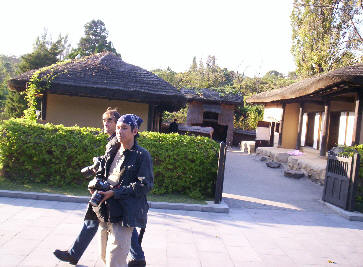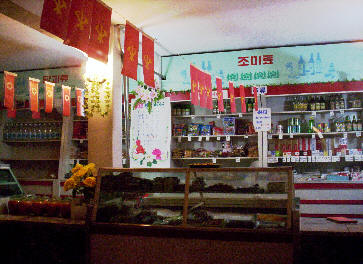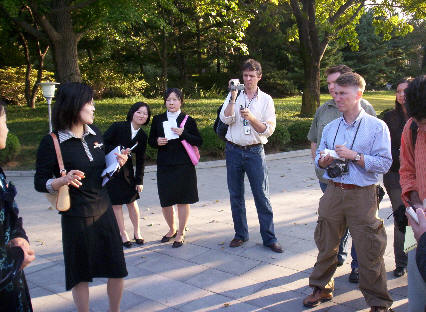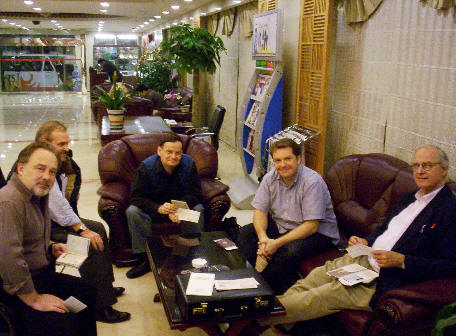L&J Development and Consultancy

Andrew Salmon, Seoul correspondent for Washington Times, visited North Korea in October 2005.
*Photos by Leonid A. Petrov
PYONGYANG, NORTH KOREA - At 2:30AM, the streets of Pyongyang are largely unlit, almost silent, and virtually empty.
A cough echoes across the wide boulevards. A couple walk by arm in arm, almost invisible in the shadows. In a kiosk selling sweet potatoes, the serving woman snores on the counter. Illuminated portraits of the Great Leader smile from illuminated alcoves.

With their day schedules being tightly controlled, a group of 17 journalists who visited the secretive state this month on a media tour found that the only time they could wander freely was to slip out of their hotels after midnight.
But in Pyongyang, is one ever unobserved?
This reporter was startled when an invisible loudspeaker, droning unintelligible Korean from a side-street, suddenly burst into “Hello, hello!” as he passed.
Having covered North Korea from Seoul for over two years, it was quite an experience being in “Kim’s Kingdom” at last. It’s an odd beat. No Western reporters are based in Pyongyang, and there is no government PR department to call. However, with the nation being one of the world’s great headline generators, media organizations cover it by remote from Tokyo, Beijing or Seoul. Much reporting is thus a mix of interpretation, analysis and informed guesswork.
On the ground, dredging up information proved no easier. Official statistics are not published.Getting anything face to face is difficult for two reasons. One, North Koreans clearly have little information themselves beyond the basic. Two, everybody in Pyongyang very clearly feels obliged to spout the party line once a political issue is raised; personal opinions remain unspoken.
 Take
wages. With reporters keen to gauge peoples’ earnings, we asked at an embroidery
collective. We were told the basic wage is 2,000 won, but most worker’s basic is
3,000 won – although, during busy periods they can make up to 30,000 won. The
next day, reporters who asked the same questions were told the basic was 10,000
won.
Take
wages. With reporters keen to gauge peoples’ earnings, we asked at an embroidery
collective. We were told the basic wage is 2,000 won, but most worker’s basic is
3,000 won – although, during busy periods they can make up to 30,000 won. The
next day, reporters who asked the same questions were told the basic was 10,000
won.
Even the museums, in the words of Dr. Andrei Lankov, a Russian academic who led the group, “are designed more to showcase the activities of the Leaders on their visits to the museums, than the objects being exhibited.” Indeed. In the embroidery collective, there was a diagram illustrating Kim Il-sung’s footsteps around the building.
Even so, the trip was not just ticket punching (“Yeah, I’ve been to North Korea”): Observation proved rewarding.
A convoy of perhaps 50 military trucks lined up along one
road were loaded with boxed television sets. Gifts to the boys from the regime’s
leadership, this was the “military first” policy in action.

In the countryside, the largely treeless hillsides remain un-terraced – meaning disastrous floods and resultant famines could strike again.
Street side kiosks, selling soft drinks, flowers, snacks, etc, are if not ubiquitous, common. Market economics are taking hold, even if the organizational/ownership structure is unclear.
And in the rare moments of unscripted contact, it was clear that North Koreans are not the robotic communist Taliban of myth. They are actually a proud, warm, kind-hearted people - albeit propagandized to the nth degree. Even our formidable minder – who delighted in red-faced, finger-wagging, table-thumping diatribes against Washington – proved a karaoke star.
 The
Koryo Hotel’s bar has a Casablanca-type ambience as cadres and foreign visitors
mingle guardedly over the (excellent) house ale. But officials are skittish once
they realize they are in the company of reporters. After 10 minutes of small
talk, a young, high-ranking cadre who had studied in the West left our table
with a polite smile. Minutes later, his guest, an American planning a charity
project, received a phone call. He returned, mumbled, “You guys are persona non
grata” and left.
The
Koryo Hotel’s bar has a Casablanca-type ambience as cadres and foreign visitors
mingle guardedly over the (excellent) house ale. But officials are skittish once
they realize they are in the company of reporters. After 10 minutes of small
talk, a young, high-ranking cadre who had studied in the West left our table
with a polite smile. Minutes later, his guest, an American planning a charity
project, received a phone call. He returned, mumbled, “You guys are persona non
grata” and left.
Invariably, members of Pyongyang’s expatriate community proved the best sources.
In terms of “headline stories” we caught no glimpse of anti-regime activity, got nary a whiff of the gulag, and saw not a single nuclear missile. Nor, alas, did we get an interview with Kim Jong-il.
But it was worth it. Now, when I write of North Korea, I have a more intimate grasp; that critical “feel” of a place.
Oh, and that midnight walk? All I saw was a sleeping city - but I still wonder about that loudspeaker.
If you need more information about special tours to North Korea for journalists, please contact us using the following address: LJinfo@narod.ru
